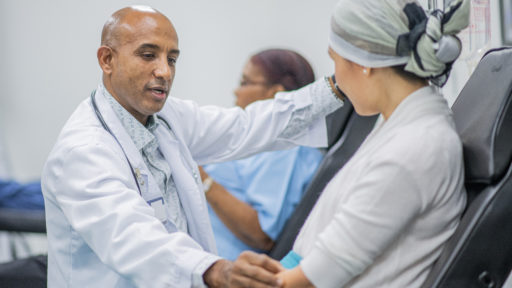Systems Biology Based Diagnosis of Circulating Lung Tumor Cells
A UAMS research project is exploring how the special characteristics of growing lung cancer cells might be used to increase the effectiveness of individualized therapies to halt the disease.
Gunnar Boysen, Ph.D., is lead investigator on the project, “Systems Biology Based Diagnosis of Circulating Lung Tumor Cells,” and Rosalind Penney, Ph.D., is co-investigator. Boysen and Penney are faculty in the Department of Environmental and Occupational Health in the UAMS Fay W. Boozman College of Public Health.
The project’s aim is to maximize the effectiveness of new lung cancer therapies that target the metabolic processes within a tumor cell. Scientists believe that a tumor’s cell metabolism changes as a cancer advances, and disruption of these processes can help slow or stop a cancer’s spread.
“We have constructed a method that determines which metabolic pathways are targeted by various therapy regimens and want to find out if these metabolic changes can lead to the development of personalized medicine,” Boysen said.
Cancer cells collected from the patients at UAMS will be analyzed to understand a tumor’s metabolic properties relative to the type and stage of the cancer, how fast it is spreading, and the patient’s survival.
If successful, these findings will make it possible to develop clinical biomarkers that can be used to personalize therapies.
Eric Siegel, research associate in the UAMS Department of Biostatistics, and Daniel Sappington, Ph.D. candidate, are also on the project.
Integrative-omics-derived genes to improve detection of lung cancer clinical subtypes
More people die of lung cancer annually than of prostate, colon, and breast cancers combined, making it the leading cause of cancer-related mortality in the United States. There are two main categories of lung cancers: small cell lung cancer (SCLC) and non-small cell lung cancer (NSCLC). NSCLC is the predominant lung cancer category accounting for about 85 percent of all diagnosed lung cancers. NSCLC can further be clinically subdivided into three main histological subtypes defined as adenocarcinoma, squamous cell carcinoma, and large cell carcinoma.
Currently, understanding of the causes and progression of lung cancer is limited. Many studies have revealed certain genes that are associated with NSCLC; however, these genes cannot completely and uniquely identify the subtype-specific clinical phenotypes. Even with the advancement of technology for the characterization of histological features and lung cancer subtypes, precise characterization of NSCLC tissues using histopathological methods remains a difficult task. Currently, global messenger RNA expression microarrays cannot completely and reliably distinguish between NSCLC phenotypes or subtypes. Knowing the subtypes is crucial in evaluating the extent of disease and subtype-specific staging for the purpose of determining the choice of treatment.
Along these lines, principal investigator Mohammed Orloff, Ph.D., is using integrative-omics-derived candidate genes from his previous study to improve detection of lung cancer phenotypes in Arkansas patients. Orloff is an associate professor in the Department of Epidemiology in the UAMS Fay w. Boozman College of Public Health.
This study takes advantage of patient specific genetic heterogeneity or mutations to improve precision to identify patients displaying specific mRNA expressions correlating to specific NSCLC subtypes (i.e. uniquely identify either adenocarcinomas or squamous cell carcinomas). Being able to accurately quantify mRNA transcripts associated with specific NSCLC subtypes will pave the way for a more precise early diagnosis of lung cancer subtypes and further the research into patient-specific interventions. More importantly, this study will benefit the population of Arkansas which has experienced high rates of lung cancer that exceeds the national average.
Team members for this project include Lisa M. Alley, M.S.; Rosalind B. Penney Ph.D.; Konstantinos Arnaoutakis M.D.; Matthew Steliga M.D.; and Susanne K. Jeffus M.D.


